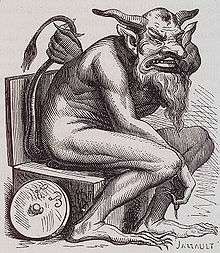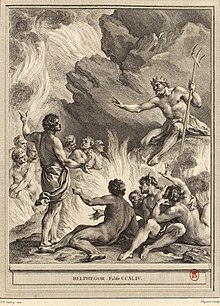Belphegor
In demonology, Belphegor (or Beelphegor, Hebrew: בַּעַל-פְּעוֹר baʿal-pə[ġ]ʿōr - Lord of the Gap) is a demon, and one of the seven princes of Hell, who helps people make discoveries. He seduces people by suggesting to them ingenious inventions that will make them rich.


Bishop and witch-hunter Peter Binsfeld believed that Belphegor tempts by means of laziness.[1] Also, according to Peter Binsfeld's Binsfeld's Classification of Demons, Belphegor is the chief demon of the deadly sin known as Sloth in Christian tradition.[2]
History
Belphegor originated as Baal-Peor, the Moabite, the father of God to whom the Israelites became attached in Shittim (Numbers 25:3), which was associated with licentiousness and orgies. It was worshipped in the form of a phallus. As a demon, he is described in Kabbalistic writings as the "disputer", the counterpart of the sixth Sephiroth "beauty". When summoned, he can grant riches, the power of discovery and ingenious invention. His role as a demon was to sow discord among men and seduce them to evil through the apportionment of wealth.
The palindromic prime number 1000000000000066600000000000001 is known as Belphegor's Prime, due to the significance of containing the number 666, on both sides enclosed by thirteen zeroes and a one. An entire sequence of "palindromic Belphegor numbers" is formed from computing (10^(n+3)+666)*10^(n+1)+1 for different values of n: 16661, 1066601, 100666001, 10006660001, 1000066600001, 100000666000001, 10000006660000001, 1000000066600000001, 100000000666000000001, 10000000006660000000001, 1000000000066600000000001, 100000000000666000000000001, 10000000000006660000000000001, 1000000000000066600000000000001.[3] All of these numbers are palindromic and contain "666", but only the first and last are prime.
According to De Plancy's Dictionnaire Infernal, Belphegor was Hell's ambassador to France. Consequently, his adversary is St Mary Magdalene, one of the patron saints of France.
Belphegor also figures in John Milton's Paradise Lost and in Victor Hugo's The Toilers of the Sea. Belfagor arcidiavolo by the Italian diplomat Niccolò Machiavelli was first published in 1549 and regales how the demon comes to earth to find a mate. This story became the initial source material for Ottorino Respighi's opera Belfagor which premiered at La Scala in Milan in 1923.
References
- Wendy Doniger (1999). Merriam-Webster's Encyclopedia of World Religions. Merriam-Webster. p. 287. ISBN 0-87779-044-2.
Belphegor Demon.
- Encyclopedia of Demons and Demonology, By Rosemary Guiley, p. 28-29, Facts on File, 2009.
- https://oeis.org/A232449